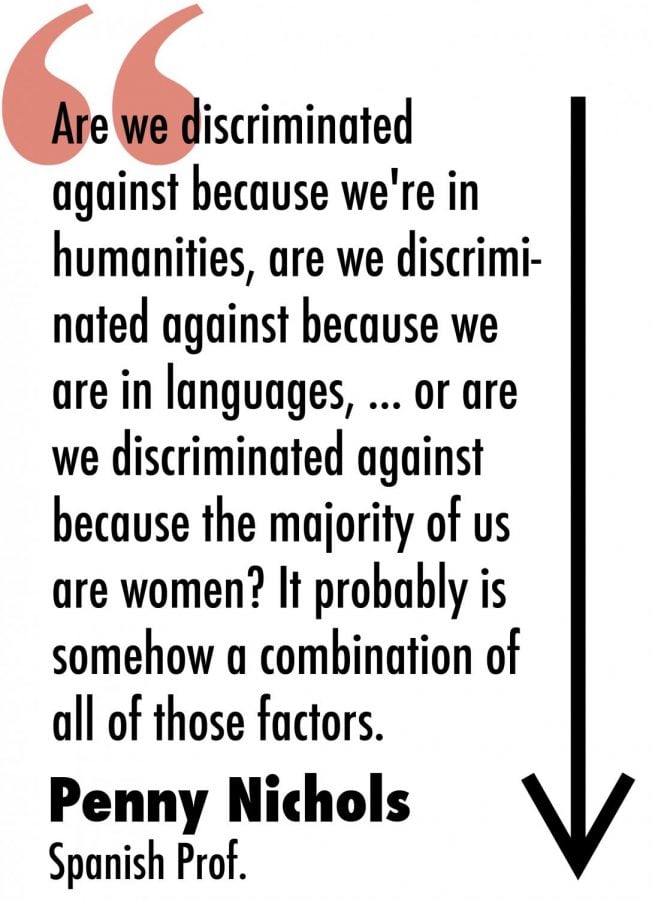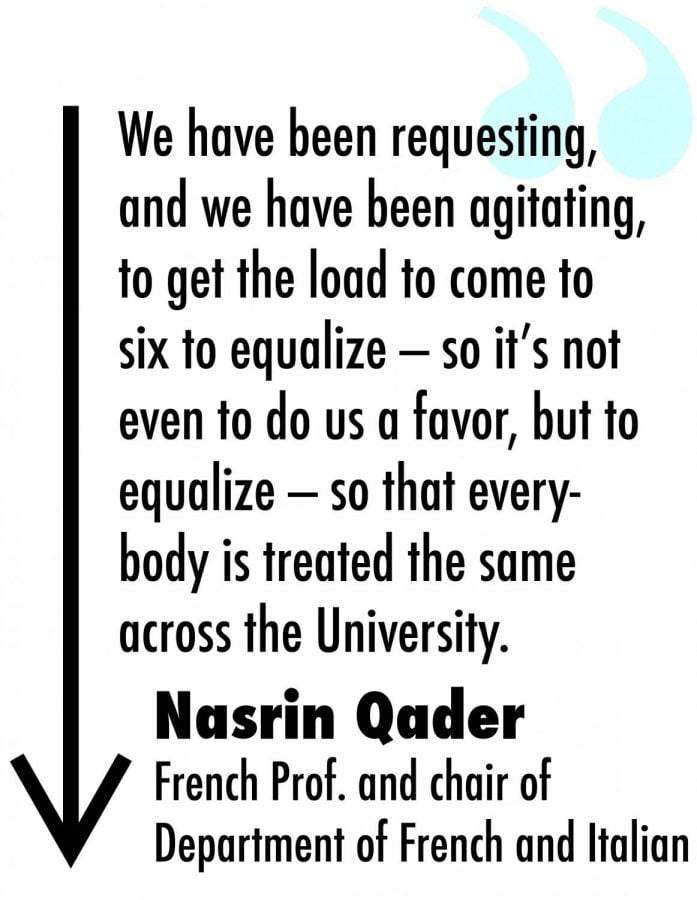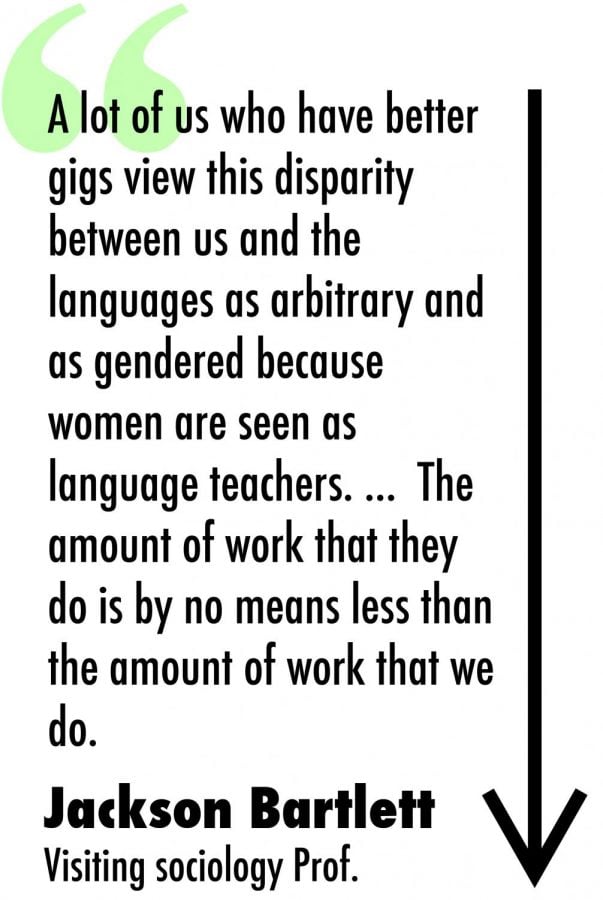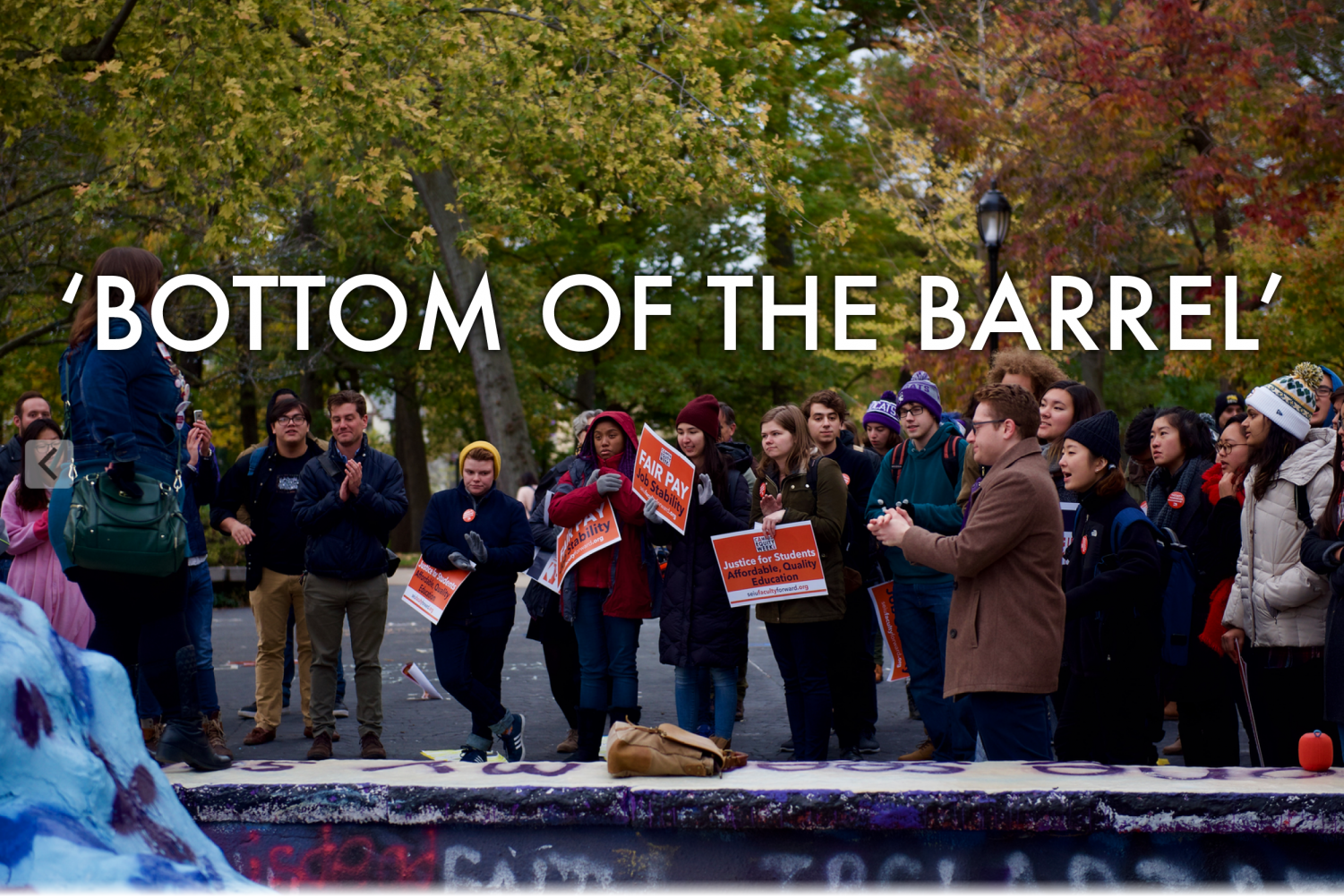In Focus: As NU goes global, professors raise concerns of pay, gender equity among non-tenure language faculty
November 21, 2017
At Northwestern, not all faculty feel they are treated equally.
According to a survey on faculty compensation, 50 percent of all instructional or clinical faculty — who are ineligible for tenure — were satisfied with their salaries. But for those in the humanities in the Weinberg College of Arts and Sciences, satisfaction dropped to just over 20 percent.
Full-time, non-tenure eligible faculty who teach humanities courses like language, religion and philosophy are typically at the bottom of the pay scale compared to their colleagues. For language faculty, this disparity feels particularly pronounced, in part because they often face larger teaching loads.
Spanish Prof. Penny Nichols said she feels a “long-standing tradition” discredits her work as a foreign language professor. As someone with a heavy course load, she said she — and other faculty who teach foreign languages — still tend to earn salaries at the “bottom of the barrel.”
She said though full-time, non-tenure eligible faculty who teach foreign languages receive support and benefits from the University, there are still issues with pay equity.
As NU expands its global reach, those faculty in foreign languages not only teach a larger course load than others in Weinberg, but are also predominantly women.
Administrators said different fields command varying salaries due to factors like outside competition and tenure eligibility.
Weinberg Dean Adrian Randolph told The Daily in an email that language instruction is a “clear priority,” and that administrators don’t take gender into account when setting pay.
While Nichols said she doesn’t believe faculty who teach foreign languages are paid less only because they’re women, she said gender may play a factor.
“It’s hard to distinguish why we’re discriminated against,” Nichols said. “Are we discriminated against because we’re in humanities, are we discriminated against because we are in languages … or are we discriminated against because the majority of us are women? It probably is somehow a combination of all of those factors.”
Faculty divides
Faculty are split among tenure lines, which can create an explicit and implicit “hierarchy,” said French Prof. Nasrin Qader, chair of the Department of French and Italian.
Those on the tenure track are offered different benefits and job security, according to the Faculty Handbook. Non-tenure track faculty, which include teaching-track faculty, work on a contractual basis and are evaluated for reappointment or promotion.
Qader, who is tenured, said non-tenure eligible faculty within her department usually teach lower-level language classes. Tenure-track faculty mostly teach upper-level literature courses. She said she makes salary recommendations for French and Italian faculty, which requires her to track their work.
Many faculty members are conscious of their contracts, which may prevent them from critiquing the University, she said.

“That always affects the way that they see themselves within the institution,” Qader said. “That makes them … less certain in their position within the University and makes them a little bit more vulnerable.”
Over the past four decades, the share of full-time tenured or tenure-track faculty has decreased nationwide, while the share of full-time, non-tenure track faculty has risen, according to a study by the American Association of University Professors.
Tenure-track faculty face different professional expectations, like researching and publishing their work, Provost Jonathan Holloway told The Daily earlier this month. Non-tenure track faculty, however, are primarily viewed as teachers and can therefore face heavier course loads, he said.
Foreign language instruction spreads across several departments and programs, and many of their core faculty are ineligible for tenure. According to the AAUP, large departments that teach many sections of required freshman courses, like in foreign languages, “often have the highest density of non-tenure-track faculty.”
Nearly 35 percent of Weinberg full-time faculty were on the non-tenure track, according to a 2016 report by the Faculty Senate’s Non-Tenure Eligible Committee.
A copy of a faculty salary table obtained by The Daily summarizes median salaries of full-time, non-tenure eligible instructional faculty from the 2016-17 academic year. The table shows median salaries of each school at different levels.
Assistant professors of instruction from the Weinberg humanities had the lowest reported median salary at $57,400, compared to $79,000 in the Weinberg social sciences and $73,500 in the Weinberg natural sciences.
The table left out median salaries in the group from the Bienen School of Music, the School of Communication and the McCormick School of Engineering because it excluded salary figures for categories with less than five people. Salaries reported on the table are on a nine-month basis.
Beyond an imbalance between fields, several professors expressed concern that differences in salary could also indicate a gender equity issue.
Gender breakdowns
Qader said she doesn’t see an issue of pay equity within her own department, but at the “structural” level as many faculty who teach foreign languages are women.
“(The gender breakdown) happens that way for personal reasons, for societal reasons, for whatever reasons that women end up taking these jobs,” she said. “But then that raises the issue of workload, of place within the institution, issues of hierarchy and, of course, pay.”
Some have voiced concern that many of the full-time faculty who teach foreign languages and are ineligible for tenure, are women.
Women make up about 91 percent of core full-time, non-tenure eligible faculty within the Department of Spanish and Portuguese, nearly 85 percent in the Department of French and Italian and about 81 percent in the Department of Asian Languages and Cultures — excluding visiting, affiliated and emeritus faculty.
In spring 2015, then-provost Dan Linzer and associate provost for faculty Lindsay Chase-Lansdale launched an initiative to “heighten the success” of faculty, which included a Faculty Perspectives Survey. Nearly 70 percent of NU faculty completed it, excluding responses from medical clinical faculty.
Chase-Lansdale deferred comment for this story to Randolph, who said in an email the University is “committed to fairness when it comes to setting pay.”

Crowe Hall houses many offices of non-tenure eligible faculty who teach foreign languages. Professors raised concerns of pay and gender equity among that group due to their greater teaching loads.
A copy of a preliminary report obtained by The Daily addresses issues of salaries and equity.
To measure faculty salary equity among non-tenure track faculty, NU statisticians used two models with different variables, including demographic information and Course and Teacher Evaluation responses. However, the report noted that “due to the relatively small size” of faculty in some schools and departments, there were limitations to measuring pay inequity.
The report found “no statistically significant differences” between men’s and women’s salaries for instructional or clinical faculty by rank.
Another preliminary report obtained by The Daily examined diversity and inclusion. According to responses from the Faculty Perspectives Study, 47 percent of instructional or clinical faculty within Weinberg’s humanities agreed that from their perspective, “the work climate/culture is supportive regardless of a person’s gender.”
In the same study, 54 percent of the same group agreed that the climate and opportunities for female faculty are equivalent to those for male faculty within their department.
Karen Alter, co-chair of the Organization of Women Faculty, which examines issues of gender equity and diversity at NU, said the study was “incomplete.” She said it failed to capture the full picture of pay and gender inequity for non-tenure track faculty.
Alter, a tenured political science professor, said though the study was a “very valiant” initial effort, a “do-over” is in order.
“This was the first, most comprehensive evaluation of pay equity, I think, in Northwestern’s history,” Alter said. “It’s a huge advance, but it could not do everything. And there’s the recognition that, especially with respect to teaching-track faculty, it really didn’t work.”
Still, Spanish Prof. Heather Colburn, another co-chair of the OWF, said faculty who teach foreign languages at NU are in better positions than others at different schools.
Colburn pointed to multi-year contracts and clear paths to promotion as positive steps Weinberg has taken for non-tenure track faculty.
“There are a lot of perceived, and in a lot of cases, very real issues for non-tenure eligible faculty in languages in Weinberg,” Colburn said. “But again, Weinberg is really ahead of the curve in a lot of ways.”
University President Morton Schapiro told The Daily earlier this month that the pay equity study could help address any related issues.
“It’s important to really look into it, as we’ve done,” Schapiro said, “And figure out, in fact, whether there’s some imbalance — and if there is, you address it.”
Holloway said he will work with Randolph and other deans in the spring to set faculty salaries.
He said market forces and “resource management” can drive salaries. He added that “great discrepancies” exist between salaries, which reflect different fields.
“We can’t be a sole actor in mitigating the market,” Holloway said. “The fact is, the market pressures are really quite strong.”
He added that the study and conversations with the OWF may help guide him and others when determining details about salaries, but it’s “premature” to say how.
Issues of pay and gender equity for non-tenure eligible faculty who teach foreign languages may exist at NU, Holloway said.
“I know it’s a national issue,” he said. “I don’t know enough yet to say if it’s a Northwestern issue. I’d be surprised if it weren’t a Northwestern issue.”
“We are overwhelmed”
Most full-time, non-tenure eligible faculty in Weinberg teach six courses per academic year, but those in foreign languages are required to take on nine, according to the Non-Tenure Eligible Committee’s report.
Colburn said faculty who teach foreign languages face more demanding workloads if they teach three different courses per quarter.
“A lot of teaching-track faculty in languages feel that we know that our reappointment decisions, our promotion decisions in part are based on our teaching,” Colburn said. “A big concern … (is) that doesn’t allow a lot of time to do those other things that are really necessary to get to the next level, to be promoted.”
People often misunderstand how much preparation work is required to make language courses dynamic and interactive, said Nichols, the Spanish professor.
She said because the approach to teaching foreign languages is always evolving, professors must attend conferences to stay up-to-date. She added that professors who teach foreign languages are “put upon” and the nine-unit teaching requirement can hinder their involvement.
“That means that we can’t possibly do a lot of outside things,” Nichols said. “Whether it’s serving on University committees, whether it’s doing research, whether it’s professional development — any of those things, because we just don’t have the time to do it. We are overwhelmed.”
Italian lecturer Alessandra Visconti said the nine-unit teaching requirement is so “onerous” that it’s nearly impossible to “stay abreast” of the latest developments in language teaching.
Visconti said teaching several sections of the same course in one quarter doesn’t necessarily reduce her preparation because she must tailor lessons to each class.
“Every class is different. So it doesn’t mean that when you teach one class at 10 and again the same level at 12, you’re going to be teaching the exact same material,” Visconti said. “Anyone who thinks that doesn’t really understand teaching and learning.”
Despite the limited time available for non-tenure eligible faculty to devote to additional matters, the report estimated that most also conduct research, serve on committees or perform administrative work.
Japanese Prof. Noriko Taira Yasohama said some quarters she teaches more than one section of the same level course. However, she said she’s “overloading” due to her administrative work as the director of language programs in the Department of Asian Languages and Cultures.
“Doing that and then doing administrative work, it’s really hard to even manage what I’m supposed to do,” she said.
Qader, the Department of French and Italian chair, said despite some misconceptions, teaching-track faculty “don’t just teach.” Instead, they involve themselves in their departments and engage with students outside class, like practicing foreign languages over lunch, she said.
She added that teaching foreign languages is rigorous because teachers root learning in “broader cultural instruction.”
Qader said the teaching load is neither reasonable nor sustainable given everything chairs ask of non-tenure eligible faculty.
“We have been requesting, and we have been agitating, to get the load to come to six to equalize … so that everybody is treated the same across the University,” Qader said. “We don’t really buy the whole argument that multi-section classes require so much less work that you have to teach three extra courses.”
Economics Prof. Mark Witte, who is ineligible for tenure and teaches six courses per year, said the University must offer competitive salaries to incentivize professors to teach rather than work in the private sector.
Witte said though he’s happy with his current course load, he would likely be unable to keep up with his outside commitments if he had to teach nine courses per year.
“I couldn’t read as much about the field,” Witte said. “I certainly couldn’t afford to go to any conferences. It would limit what kind of creativity I could bring to the classroom to change things up.”
Randolph, the Weinberg dean, said in an email that teaching loads are “variable” across Weinberg, including among tenure- and non-tenure track faculty. He added that NU is at the “vanguard” of higher education in offering full-time employment to faculty on the teaching track.
“(Teaching loads) may be dependent upon the assignment of duties other than teaching courses, number of preparations as well as a variety of other factors,” Randolph said. “We are clear when we run searches for tenure-track and teaching track positions what the teaching expectations are.”
Going global
In 2016, the Global Strategy Task Force — convened after Roberta Buffett Elliott’s more than $100 million donation — released a report to increase NU’s global stature. One of the recommendations aimed to “support language study and training.”
“Language competency training in support of global research, teaching, learning, and service should not be constrained by enrollment,” the report said.
The report determined the University has a “significant opportunity” to raise its visibility abroad in part by using “ambitious, cohesive marketing.”
Political science Prof. Elizabeth Shakman Hurd, Weinberg’s sole representative on the task force, said results of the report must be followed through at all levels of the University.
Kellogg Dean Sally Blount, a co-chair of the Global Strategy Task Force, deferred comment to Randolph, and executive vice president Nim Chinniah, the other co-chair, deferred to Chase-Lansdale.
Alter, one of the OWF co-chairs, said though NU can’t counter the market, administrators should recognize those faculty who help accomplish its initiatives, including going global.
She added that many goals tend to be “labor-intensive” and fall on women faculty.
“Northwestern has a set of new and wonderful goals, including language teaching,” Alter said. “There should be a greater match between salary and goals. … Put the resources there, and reward the people who make contributions to these goals.”
Schapiro said he was unaware of the greater teaching requirement for non-tenure eligible faculty who teach foreign languages, but said they play an important role in NU’s globalizing mission.
“One of the most important things we hope people get out of a Northwestern education is cultural literacy,” he said. “I don’t know if (foreign language instruction is) more important now than it was, I think it’s always been extraordinarily important.”
A more perfect union
Visconti, the Italian lecturer, said the only solution to achieve greater pay equity is to sit down as a union and bargain with the University.
In May, the National Labor Relations Board certified majority support from non-tenure eligible faculty to join the Service Employees International Union after faculty filed for an election in June 2016. However, the University has refused to bargain with the union, citing over two dozen contested ballots. In response, the union filed unfair labor charges.
Nichols said there’s “no doubt” many faculty who teach foreign languages favored unionization, given they want parity with their peers.
Bargaining with the union will bring greater transparency and equity, Visconti said. She added that while she understands market values can determine salaries, nonprofit universities — even private ones — should foster studies in the humanities.
 “I don’t think market value really should determine how much someone who may be a Nobel Laureate gets paid,” Visconti said. “Market value should stay in the market, and I don’t think that the University should become a market.”
“I don’t think market value really should determine how much someone who may be a Nobel Laureate gets paid,” Visconti said. “Market value should stay in the market, and I don’t think that the University should become a market.”
Visiting sociology Prof. Jackson Bartlett, an organizer of unionization efforts, said he noticed many involved have been language and creative writing faculty members.
“One of our broader strategies is to lift up the bottom,” Bartlett said, “and to pick up some of the most egregious injustices on campus — and languages is definitely one of them.”
He said he’s encouraged others to be more transparent about their pay so greater equity can be achieved. Bartlett, who was hired right after receiving his doctorate, said he may have the “sweetest deal” because he has his own office and other benefits.
“A lot of us who have better gigs view this disparity between us and the languages as arbitrary and as gendered because women are seen as language teachers,” Bartlett said. “The amount of work that they do is by no means less than the amount of work that we do.”
Nichols said the University can show the importance of language instructors by lowering teaching loads and raising salaries.
Holloway said he acknowledges that the teaching load is heavier, but that it comes with the job. He said the best way to manage resources is to take cues from the market.
“Say we wanted to change radically the pay structure for our lowest-paid faculty in whatever field that is,” Holloway said. “That’s a great thing, but then before you know it, you don’t have the resources to continue.”
An equitable future
Randolph said in an email the University is “in the midst of appointing a committee to consider how best to support language instruction.”
Moving forward, faculty from many departments said the importance of language instruction and pay equity must be better understood.
Nichols said concerns of gender equity are still prevalent after years of advocacy.
“It’s much better than it used to be, but it’s still not ideal,” she said.
Hurd, the political science professor, said concerns about language instruction were raised during outreach events as the Global Strategy Task Force asked faculty about pressing issues.
She added that moving forward, the University must commit to upholding the recommendations outlined in the task force.
“If you want to globalize Northwestern, you’ve got to have serious and comprehensive and well-paid language instruction,” Hurd said. “That means, of course, getting the best instructors, paying them what they deserve and treating them with the respect that they deserve, as people who are integral to Northwestern’s global mission.”
Email: [email protected]
Twitter: @ericasnoww

